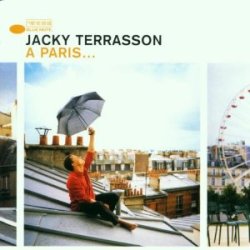Jacky Terrason – A Paris (2001)
Jacky Terrason – A Paris (2001)

01. Plaisir d'amour (3:11) play 02. Les Chemins de L'amour (4:24) 03. Jeux Interdits (6:27) 04. Á Paris (8:52) 05. I Love Paris in the Springtime (3:10) play 06. Que Reste-T'il de Nos Amours? (4:20) 07. Ne Me Quitte Pas (4:43) 08. La Vie en Rose (3:11) 09. Nantes (2:00) 10. La Marseillaise (3:16) 11. Rue de Lombards (1:08) 12. L'aigle Noir (3:22) 13. I Love You More (6:22) 14. Métro (1:32) Album Credits Jacky Terrasson, piano, Fender Rhodes, rain stick Stefano di Battista, sax Gregoire Maret, harmonica Bireli Lagréne, guitar Stefon Harris, marimba Remi Vignolo, Ugonna Okegwo, bass Terreon Gully, Leon Parker, drums Minino Garay, percussion
With A Paris, fleet-fingered pianist Jacky Terrasson delivers a soulful and sonic tribute to the City of Light and France. Backed by drummers Terreon Gully and Leon Parker, percussionist Minio Gara, Stefon Harris on marimba, and bassists Remi Vignolo and Ugonna Okegwo, Terrasson--who's worked with vocalists Betty Carter and Cassandra Wilson--reinterprets a number of classic French chansons into a diverse array of jazz idioms. His trio takes of "Plaisir d' Amour," and "Les Chemins de L'Amour" recall the gospel timbre of Abdullah Ibrahim and the delicate phrasings of Bill Evans. Alto/soprano saxophonist Stefano di Battista adds his snaky lines to the modal McCoy Tyner-tinged "Jeux Interdits" and to the North African nuances of "L'Aigle Noir." "La Vie en Rose" swings with an Afro-Caribbean beat, while "Ne Me Quitte Pas" and the title track are flavored by Gregoire Maret's Gallic harmonica and Gypsy guitarist Bireli Lagrene. Terrasson's heartfelt waltz rendition of the national anthem, "La Marseillaise," puts Bastille Day in a new jazzy light. --Eugene Holley, Jr., Editorial Reviews
Jacky Terrasson's 1999 album, What It Is, represented something of a risk. The young pianist's first three albums were barebones trio affairs that had won him rave reviews, whereas What It Is featured additional instruments and was more slickly produced. Gone, it seemed, was the sparse, acoustic approach that had originally given Terrasson his fame. But while this new direction yielded mixed results and left some fans a bit befuddled, one had to respect Terrasson's need to grow and evolve as an artist.Terrasson does much better with his follow-up, A Paris, an homage to the city of his youth and early adulthood. While not a return to the simple piano trio format (there are five guest musicians in addition to two alternating rhythm sections), the album has a spontaneous, natural sound that was lacking from the studio-centric What It Is. What's more, A Paris is packed with new and varied ideas that work, not to mention passionate, fiery playing throughout.Only the last two tracks are originals, the fewest ever on a Terrasson album. "Rue de Lombards," a funk fragment that sounds like an in-studio improvisation, is credited to Terrasson, drummer Terreon Gully, and bassist Remi Vignolo. The rest of the tracks are Terrasson's highly personal readings of songs from French culture. Most will not be familiar to American listeners, with the possible exception of "La Marseillaise" -- the French national anthem -- and the Edith Piaf classic "La Vie en Rose," played in a calypso feel by Terrasson and percussionist Minino Gara.Guitarist Bireli Lagrene's cameos on the bluesy title track and the swinging "Que Reste-T'Il de Nos Amours?" are nothing short of brilliant. The latter, which bears an uncanny likeness to Lerner & Loewe's "Almost Like Being in Love," features Terrasson on Fender Rhodes electric piano. Saxophonist Stefano di Battista also makes two fine appearances, playing tenor on the fast, tense "Jeux Interdits" and soprano on the lively and pretty "L'Aigle Noir," one of the two originals. Both Lagrene and Battista return for the brief, full-company finale, an intoxicating funk line by Terrasson titled "Métro."
Another highlight is Terrasson resuscitating his funk version of Cole Porter's "I Love Paris," the only song by an American writer and the very one that led off Terrasson's 1994 debut album. Bassist Ugonna Okegwo and drummer Leon Parker, Terrasson's trio mates from his first three albums, both return to play on the Porter track, as well as the opening Piaf number "Plaisir d'Amour" and an exquisite reading of Jacques Brel's "Ne Me Quitte Pas." The latter briefly features Gregoire Maret on harmonica, who played on What It Is. Several rather short pieces are grouped right around the middle of the album, giving that part of the program a collage-like feel that can seem a bit superficial. That aside, Terrasson has pulled off something rare: a concept album that succeeds on a variety of creative levels. In the process, he's given exposure to several excellent European musicians, not to mention some beautiful French music that American audiences ought to hear. --- David R. Adler, allmusic.com
download (mp3 @320 kbs):
uploaded yandex 4shared mega solidfiles zalivalka cloudmailru filecloudio oboom
Last Updated (Wednesday, 26 November 2014 22:46)








